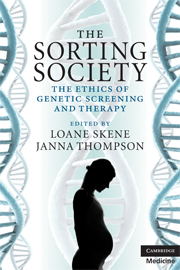Book contents
- Frontmatter
- Contents
- List of contributors
- Preface
- 1 Introduction
- 2 Genetic testing, an informed choice
- 3 Sex selection: sorting sperm as a gateway to the sorting society?
- 4 Cloning to avoid genetic disease
- 5 Procreative Beneficence: reasons to not have disabled children
- 6 Reprogenetic technologies: balancing parental procreative autonomy and social equity and justice
- 7 Genetic technology and intergenerational justice
- 8 Genetic preselection and the moral equality of individuals
- 9 Genes, identity and the ‘expressivist critique’
- 10 Overstating the biological: geneticism and essentialism in social cloning and social sex selection
- 11 The sorting society: a legal perspective
- Index
3 - Sex selection: sorting sperm as a gateway to the sorting society?
Published online by Cambridge University Press: 16 September 2009
- Frontmatter
- Contents
- List of contributors
- Preface
- 1 Introduction
- 2 Genetic testing, an informed choice
- 3 Sex selection: sorting sperm as a gateway to the sorting society?
- 4 Cloning to avoid genetic disease
- 5 Procreative Beneficence: reasons to not have disabled children
- 6 Reprogenetic technologies: balancing parental procreative autonomy and social equity and justice
- 7 Genetic technology and intergenerational justice
- 8 Genetic preselection and the moral equality of individuals
- 9 Genes, identity and the ‘expressivist critique’
- 10 Overstating the biological: geneticism and essentialism in social cloning and social sex selection
- 11 The sorting society: a legal perspective
- Index
Summary
Since ancient times, couples have been trying to influence the sex of their children. Following a suggestion by Aristotle, they were making love in the north wind to ensure the birth of a son and in the south wind to ensure the birth of a daughter. According to a proposal made by Galen, men were tying a string around their left testicle to make a boy and tying the right one to make a girl. In medieval times the proposed formula got even more bizarre when alchemists recommended to drink the blood of a lion and then have intercourse under a full moon to sire a son.
Choosing the sex of our children is no longer a fantasy. However, the prospect of a reliable method for sex selection has not only raised old hopes, but also new fears. Many people are concerned that it may lead to an imbalance of the sexes, most likely a preponderance of males. Such an overabundance of men and a shortage of women, some sociologists have predicted, will invariably cause an enormous rise in enforced celibacy, polyandry, homosexuality, prostitution, rape and other sexual crimes. Many feminists are similarly alarmed. Some have called the deliberate choice of a male child ‘the original sexist sin’. Others went so far as to warn us of an impending ‘gynocide’. Are these fears justified? How well are they supported by empirical evidence? And most of all: does sex selection call for a legal ban?
- Type
- Chapter
- Information
- The Sorting SocietyThe Ethics of Genetic Screening and Therapy, pp. 21 - 36Publisher: Cambridge University PressPrint publication year: 2008



